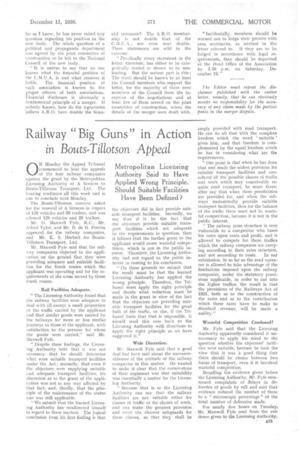Railway "Big Guns" in Action
Page 49

If you've noticed an error in this article please click here to report it so we can fix it.
in Bouts-Tillotson Appeal
Metropolitan Licensing Authority Said to Have Applied Wrong Principle. Should Suitable Facilities Have Been Defined ?
ON, Monday the Appeal Tribunal commenced to hear the appeals of the four railway companies against the grant by the Metropolitan Licensing Authority of A licences to 1.3outs-TilIotson Transport, Ltd. The hearing continues all this week and is due to conclude next Monday.
The Bouts-Tillotson concern asked fur the renewal of A licences in respect of 139 vehicles and 59 trailers, and was allowed 128 vehicles and 28 trailers.
Mr. D. Maxwell Fyfe, KG., Mr. Alfred Tylor, and Mr. B. de H. Pereira appeared for the railway companies, and Mr. E. S. Herbert for BoutsTillotson Transport, Ltd.
Mr. Maxwell Fyfe said that the railway companies objected to the application on the ground that they were providing adequate and suitable facilities for the trunk routes which the applicant was operating and for the requirements of the areas served by those trunk routes.
Rail Facilities Adequate.
"The Licensing Authority found that the railway facilities were adequate to deal with all except a small proportion of the traffic carried by the applicant and that similar goods were carried by the railways for more or less similar journeys to those of the applicant, with satisfaction to the persons for whom the goods were carried," said Mr. Maxwell Fyfe,.
" Despite these findings, the Licensing Authority held that it was not necessary that he should determine what were suitable transport facilities under the Act ; secondly, that even if the objectors. were supplying suitable and adequate transport facilities, his discretion as to the grant of the application was not in any way affected by that fact; and, thirdly, that the principle of the maintenance of the status quo was still applicable.
"We submit that the learned Licensing Authority has misdirected himself in regard to these matters. The logical conclusion from his first finding is that the objectors did in fact provide suitable transport facilities. Secondly, we say that if it be the fact that the objectors provide suitable transport facilities which are adequate to the requirements in question, then it follows that the further grant to the applicant would cause wasteful competition, which is not 41 the public interest. Therefore, the Licensing Authority had not regard to the public interest. in coming to his conclusion.
" On these grounds we submit that the result must be that the learned Licensing Authority has applied the wrong principle. Therefore, the Trtbunal must apply the right principle and decide what reduction must be made in the grant in view of the fact that the objectors are providing suitable transport facilities for the great bulk of the traffic, or else, if the Tribunal Kinds that that is impossible, it should send this case back to the Licensing Authority with directions to apply the right principle as we have suggested it," Wide Discretion.
Mr. Maxwell Fyfe said that a good deal had been said about the unreasonableness of the attitude of the railway companies in this matter. He wanted to make it clear that the corner-stone of their argument was• that suitability was essentially a matter for the Licensing Authority.
" Because that is so the Licensing Authority can say that the railway facilities are not suitable either for classes of traffic or for classes of work, and can make the greatest provision and erect the clearest safeguards for these classes, so that they shall be amply provided with road transport. He can do all that with the complete freedom which the word suitable ' • gives him, and that freedom is complemented by the equal freedom which he has in considering what are the requirements.
"Our point is that when he has clone that and made the wide-st provision for suitable transport facilities and considered all the possible classes of traffic and work which may conceivably require road transport, he must thereafter say that when these possibilities are provided for, and when the railways undoubtedly provide suitable transport facilities, then for the balance of the traffic there must not be wasteful competition, because it is not in the public interest.
" The railway rates structure is very vulnerable to a competitor who bases his rates upon costs• and profit, and is allowed to compete for these traffics which the railway companies are carrying according to their rates structure, and not according to costs. In our submission, in so far as the road operator is allowed to take advantage of the limitations imposed upon the railway companies, under the statutory provisions applicable, in order to cut into the higher traffics, the result is that the provisions of the Railways Act of 1921, both as to the construction of the rates and as to the contribution which 'these rates have to make to standard revenue, will be made a Wasteful Competition Condoned?
Mr. Fyfe said that the Licensing Authority apparently considered it unnecessary to apply his mind to the question whether the objectors' facilities were suitable, because he took the view that it was a good thing that there should be choice between two forms of transport, even if it involved wasteful competition.
Recalling the evidence given before the Licensing Authority, Mr. Fyfe mentioned complaints of delays in deliveries of goods by rail and said that evidence reduced the number of these to a " microscopic percentage" of the total number of deliveries made.
For nearly five hours on Tuesday, Mr. Maxwell Fyfe read from the evidence given to the Licensing Authority.




































































































